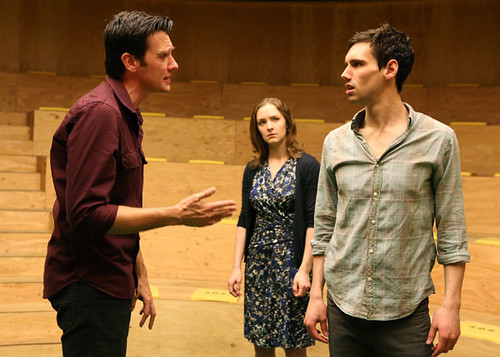Cock.
There, we said it, plain and simple. Cock. The title of Mike Bartlett’s new play, currently open at the Duke on 42nd Street, which cannot be printed in about a zillion other publications. Which triggers spam filters and makes people giggle with vague, junior high school-esque glee and discomfort.
This title—which is both incredibly appropriate for the piece and at the same time manages to stand totally apart from it—has created a maelstrom of chatter that is at times, distracting. But please, please don’t let that happen. Don’t let it distract you. Because you need to get your ass (or your cock, if you have one of those too) into that theater.
Cock is the story of John, a young man who has been in a relationship with his current boyfriend—known only as M—for a decade. After John breaks off this relationship with M he soon find himself falling in love with, and sleeping with, a woman known as W. John eventually goes back to his relationship with M, sort of, while maintaining something with W as well. From there the battle royale ensues as M and W fight to keep John for themselves, which ultimately plays out at the most awkward dinner party you can imagine. (Seriously, M’s father F gets involved here, too. It’s all kinds of uncomfortable.)
The play, both in composition and setting is styled like a Cockfight—or any number of combative sports wherein competitors fight to the death, you know, dog fights/ bullfights/gladiator games—to the extent that the set is a small, round plywood stadium. This intimate set, wherein the audience can see both the competitors and their fellow audience members at all times, heightens the sense that you are observing an illicit fight in some dirty basement.
Director James MacDonald has stripped away all artifice in this production. There are no props and no set pieces outside the arena style seating. There is almost no physical contact between the actors, even as the audience comes to understand they are taking off each other’s clothes, or having intercourse.
What we are left with, then, is dialogue. Is the way in which we wound each other, hide from each other, trap each other, exalt each other with our words. The way we build dream worlds, and dream selves, and bumble madly through real relationships, with little more than the power of language. And to that end, Bartlett’s dialogue is exquisite. He has a fantastic ear for the way in which real people, in the real twenty-first century speak to each other and he presents it beautifully within the construct of the play.
Scenes change with the ringing of a bell, as the periods of a boxing match would end, and in each scene, it is clear there is some fresh new bruise that the characters have left behind on each other. This is due in no small part to the first-rate acting happening in that arena. Cory Michael Smith was a particular standout as John, a character whose wishy-washy inability to let go of one of his partners could be seriously grating in the wrong hands. Instead, Smith’s John feels sympathetic, genuinely lost and in love with two people—and the ideas of the relationships he could have with them—at the same time. He feels whole and real and fully imagined on stage. As M, Jason Butler Harner is fantastically prickly, but deeply vulnerable at all the right moments. And Amanda Quaid’s W feels very real, like she could be the girl sitting in the seat across from you in the audience who is leaning forward, chin in hands, dying to find out what happens next.
By the end of this 90 minute slugfest of a play, no one on stage is left standing and the word “cock” itself has appeared perhaps once—all its silly giggle-inducing connotations are gone. Have been gone from the moment the cast took to the ring. What remains is the audience, left there to stare at each other and wonder if there were even any winners at all.



{ 0 comments… add one }